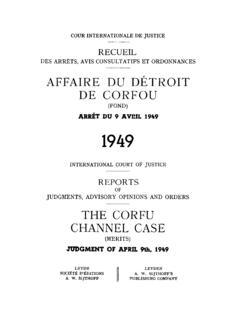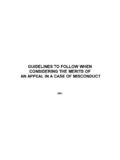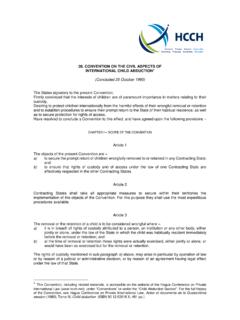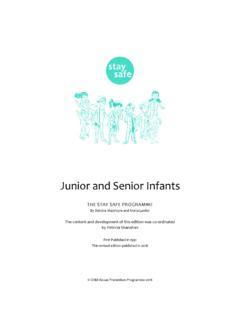Transcription of SUMMARY OF RELEVANT ASPECTS OF CORFU CHANNEL …
1 SUMMARY OF RELEVANT ASPECTS OF CORFU CHANNEL case (MERITS) Judgment of 9 April 1949 The CORFU CHANNEL case (United Kingdom of Great Britain and Northern Ireland-Albania) arose from incidents that occurred on October 22nd, 1946, in the CORFU Strait: two British destroyers struck mines in Albanian waters and suffered damage, including serious loss of life. The United Kingdom first seized the Security Council of the United Nations which, by a Resolution of April 9th, 1947, recommended the two Governments to submit the dispute to the Court. The United Kingdom accordingly submitted an Application which, after an objection to its admissibility had been raised by Albania, was the subject of a Judgment, dated March 25th, 1948, in which the Court declared that it possessed jurisdiction. On the same day the two Parties concluded a Special Agreement asking the Court to give judgment on the following questions. Only one aspect of the first question Is Albania responsible for the explosions?
2 Is RELEVANT for our purposes here. In its Judgment the Court declared on the first question, by 11 votes against 5, that Albania was responsible. The facts are as follows. On October 22nd, 1946, two British cruisers and two destroyers, coming from the south, entered the North CORFU Strait. The CHANNEL they were following, which was in Albanian waters, was regarded as safe: it had been swept in 1944 and check-swept in 1945. One of the destroyers, the Saumarez, when off Saranda, struck a mine and was gravely damaged. The other destroyer, the Volage, was sent to her assistance and, while towing her, struck another mine and was also seriously damaged. Forty-five British officers and sailors lost their lives, and forty-two others were wounded. * * * In relation to the first question, the Court finds, in the first place, that the explosions were caused by mines belonging to the minefield discovered on November 13th. It is not, indeed, contested that this minefield had been recently laid; it was in the CHANNEL , which had been previously swept and check-swept and could be regarded as safe, that the explosions had taken place.
3 The nature of the damage shows that it was due to mines of the same type as those swept on November 13th; finally, the theory that the mines discovered on November 13th might have been laid after the explosions on October 22nd is too improbable to be accepted. In these circumstances the question arises what is the legal basis of Albania's responsibility? The Court does not feel that it need pay serious attention to the suggestion that Albania herself laid the mines: that suggestion was only put forward pro memoria, without evidence in support, and could not be reconciled with the undisputed fact that, on the whole Albanian littoral, there are only a few launches and motor boats. But the United Kingdom also alleged the connivance of Albania: that the mine laying had been carried out by two Yugoslav warships by the request of Albania, or with her acquiescence. The Court finds that this collusion has not been proved. A charge of such exceptional gravity against a State would require a degree of certainty that has not been reached here, and the origin of the mines laid in Albanian territorial waters remains a matter for conjecture.
4 The United Kingdom also argued that, whoever might be the authors of the mine-laying, it could not have been effected without Albania's knowledge. True, the mere fact that mines were laid in Albanian waters neither involves prima facie responsibility nor does it shift the burden of proof. On the other hand, the exclusive control exercised by a State within its frontiers may make it impossible to furnish direct proof of facts which would involve its responsibility in case of a violation of international law. The State which is the victim must, in that ease, be allowed a more liberal recourse to inferences of fact and circumstantial evidence; such indirect evidence must be regarded as of especial weight when based on a series of facts, linked together and leading logically to a single conclusion. In the present case both evidence of the Albanian Government s attitude (its intention to keep a close watch on its territorial waters, its protest against the passage of the British fleet but not the laying of mines, its failure to notify shipping of the existence of mines) and the fact that mine-laying would have been visible to a normal lookout on the Albanian coast, lead the Court to conclude that the laying of the minefield could not have been accomplished without the knowledge of Albania.
5 The Court then considers Albania s obligations in light of this knowledge: The obligations resulting for Albania from this knowledge are not disputed between the Parties. Counsel for the Albanian Government expressly recognized that [translation] if Albania had been informed of the operation before the incidents of October 22nd, and in time to warn the British vessels and shipping in general of the existence of mines in the CORFU CHANNEL , her responsibility would be ..". The obligations incumbent upon the Albanian authorities consisted in notifying, for the benefit of shipping in general, the existence of a minefield in Albanian territorial waters and in warning the approaching British warships of the imminent danger to which the minefield exposed them. Such obligations are based, not on the Hague Convention of 1907, No. VTII, which is applicable in time of war, but on certain general and well-recognized principles, namely: elementary considerations of humanity, even more exacting in peace than in war ; the principle of the freedom of maritime communication ; and every State's obligation not to allow knowingly its territory to be used for acts contrary to the rights of other States.
6 In fact, Albania neither notified the existence of the minefield, nor warned the British warships of the danger they were approaching. (The Court goes on to consider whether Albania would have had sufficient time to notify shipping of the existence of mines, and finds that, even if the mines had been laid at the last possible moment, in the night of October 21st-22nd, the Albanian authorities could still have warned ships approaching the danger zone. There was an interval of two hours between when the British ships were reported by a look-out post and the time of the first explosion. No warning was given, and the Court held that the omission involve international responsibility for the explosions, and the damage and loss of human life to which they gave rise.)








